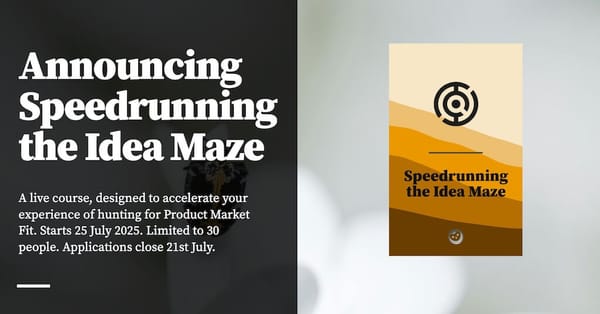Update: All 30 seats have been sold out. If you’d like to be the first to know if and when a future course opens, sign up for Commoncog’s newsletter.
Experience 10 multi-year journeys to product market fit … in four weeks.
Launching a new product? Starting a new company?
You're probably quietly terrified ... and that’s ok.
For most people, launching a new product is the scariest thing they’ll do.
It doesn’t matter if you’re a founder, launching your first startup, or a product manager, launching a new initiative for your company. As you build your thing, you begin to wonder:
- What if people don’t buy it?
- What if it doesn’t amount to much?
- What if I get career blowback on this?
- I’ve already spent so much time, what if it doesn’t work out?
This is normal. Creating and launching a brand new product is the closest thing to pure uncertainty that most folks will face.
And! If you’re like most folks, you’d reach for books and frameworks that TELL YOU HOW TO BE SUCCESSFUL — with the implication that you can increase the odds of your success.
And maybe they will!
But the odds are actually pretty good that they’re not going to work, and that your experience is going to be very different from whatever your framework teaches you.
Because — and this is something that anyone honest will tell you — there is no silver bullet to finding product market fit.
- Every company’s experience of PMF is going to be different
- Most frameworks do not work most of the time, and
- Many successful attempts at PMF were by folks who had to go at it a number of times over the course of their careers.
So: this is NOT a course that teaches you a framework for finding product market fit.
This is a course designed to accelerate your expertise through compressed experience. Synthetic experience, sure, but experience nevertheless.
What do we mean by this?
Think about going on a first date. If you’ve never gone on a first date before, you’re probably going to be very nervous. You’ll make mistakes. You may say things that — with the benefit of hindsight — you will see as dumbass moves.
But you get better. The more first dates you go on, the better things will go — even if you don’t read books or articles or watch YouTube videos or have conversations with your friends about what to do.
Why?
The glib answer is that you have more experiences. You know what to expect. You are better calibrated to do first dates.
Notice the following:
- You know that the next time you go on a first date is going to be different from the previous time. You’re meeting a new person, after all. You’re still nervous.
- But at the same time, you’re not too nervous. There are things that you expect. The small talk becomes easier. The uncertainty is more manageable. You’re less surprised by how each date unfolds.
- And so while each date is unique and different, you get better at this first date thing … so that hopefully you don’t have to do first dates anymore.
The same applies to searching for product market fit (PMF).
- Every hunt for PMF is going to be different. Every new product you build will be unique — unique market, different customers, different competitors, a custom value proposition.
- But if you’ve seen the many ways that PMF journeys can go, you’ll be less surprised. You’ll be more comfortable making decisions under the cloud of uncertainty — where you don’t know if your decisions are good or bad.
- You’ll have a lighter grip on the whole process. You’ll be more willing to roll with the punches when they come. And you’re more equipped to say: “ok, that didn’t work, let’s have another go.”
With one catch.
First dates last at most one night. A search for PMF can last years.
Which is where this course can help.
Introducing Speedrunning the Idea Maze. The goal of this course is to compress more than 65 years of product market fit experiences into four weeks.
Over the course of four sessions, we will walk you through ten journeys of companies and products that have found PMF. Most of these journeys took between two and 15 years.
You’ll experience these cases as they happen, with enough detail to make you feel like you’re experiencing the journey for yourself.
We will make sense of these cases as a group – comparing the different paths with each other, and also with your experiences, before gradually introducing the tiny handful of frameworks that actually work under such uncertainty.
In other words, we’re trying to give you memories, without the cost of years.
Speedrunning the Idea Maze costs $1000 per person and is limited to 30 people.
The program is first come, first served, and the deadline for purchase is Monday, 21st July 2025.
The program consists of 90 minute slots held once a week, for four weeks. There are two time slots for each session. The dates for the program are:
- Session 1 [24/25 Jul 2025]
- Slot 1: 8pm EDT 24 Jul 2025/8am SGT 25 Jul 2025 (timezone visualisation)
- Slot 2: 10am EDT/10pm SGT 25 Jul 2025 (timezone visualisation)
- Session 2 [31 Jul/1 Aug 2025]
- Slot 1: 8pm EDT 31 Jul 2025/8am SGT 1 Aug 2025 (timezone visualisation)
- Slot 2: 10am EDT/10pm SGT 1 Aug 2025 (timezone visualisation)
- Session 3 [7/8 Aug 2025]
- Slot 1: 8pm EDT 7 Aug 2025/8am SGT 8 Aug 2025 (timezone visualisation)
- Slot 2: 10am EDT/10pm SGT 8 Aug 2025 (timezone visualisation)
- Session 4 [14/15 Aug 2025]
- Slot 1: 8pm EDT 14 Aug 2025/8am SGT 15 Aug 2025 (timezone visualisation)
- Slot 2: 10am EDT/10pm SGT 15 Aug 2025 (timezone visualisation)
Sessions are conducted live, on Zoom, by Commoncog publisher Cedric Chin and case researcher Rhea Purohit.
Once you sign up, you’ll gain access to a Discord group, and will receive course materials before and after sessions.
How do we know this approach works?
Speedrunning the Idea Maze is built around an expertise acceleration approach called Cognitive Flexibility Theory, that has been used by the US military (amongst other organisations) to speed up training.
The theory explains why investors and businesspeople think in terms of fragments of cases when reasoning about their domain. It tells us why folks like Warren Buffett and Charlie Munger read and collect large amounts of biographies and company reports ... and more importantly how they consume them.
All of the cases in this course will be taught in this very same way.
You may read more about the method here.
Frequently asked questions
How does the cap for seats work?
This cohort will have a maximum of 30 people. This is first come first served, with a purchase deadline on 21st July 2025.
What happens if a participant misses a session?
After the completion of each session, the course materials as well as video recording will be uploaded and made available to the group. The participant may consult these materials to catch-up. They may also pose any questions in the Discord chat!
Since this is a live course with participants across different time-zones, how will the sessions be scheduled?
There will be two sessions a week, and folks can choose to drop by on either session.
- Fridays 8am SGT / 1am CET / Thursdays 5pm PT / 8pm EDT
- Friday 10pm SGT / 3pm CET / 7am PT / 10am EDT
If you want to attend but can't make any of these times, please fill in this 15 second form.
How will the sessions be structured? Is there a format?
A loose format for each session will include 70% of interactive teaching time led by the instructors with two cases per session, and 30% discussion time between participants. Two additional cases will be assigned as class reading.
Can a participant ask for a refund if they are not satisfied at the end of the course?
Since Speedrunning the Idea Maze is an experiential course, no refunds will be allowed after the course is concluded.
Can a participant ask for a refund if they can’t make the times?
Yes, but only in the first week (no more refunds will be issued after 1 August). Because seats are limited, we request that you do not purchase if you cannot make the commitment. The date+times are fully available to you before purchase.
Who will be teaching the sessions?
This course is taught by Cedric Chin and Rhea Purohit. They have both written many of the cases that are covered in this course. Some sessions will be taken by Rhea, and others will be taken by Cedric.
Originally published , last updated .





